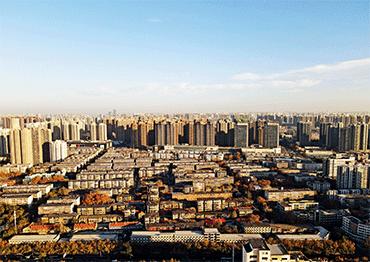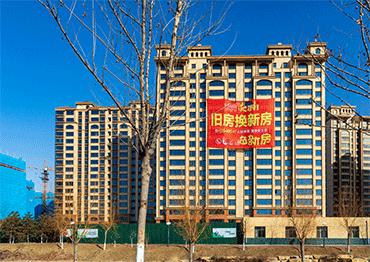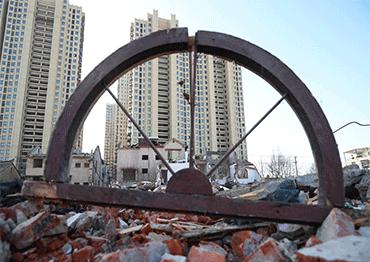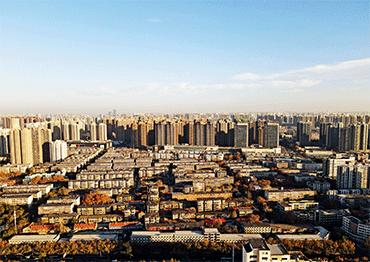Amid the ongoing challenges in China’s property market, local governments are adopting trade-in policies that aim to incentivize new home purchases by acquiring buyers’ preowned homes
Following the debt crisis experienced by major real estate companies last year, China's housing market has continued to come under severe pressure.
Official data shows that sales areas of new build commercial properties in the first quarter dropped by 19.4 percent on 2023, with residential sales areas down by 23.4 percent. Sales revenue decline is even bigger, down 27.6 percent for all new build commercial properties and 30.7 percent for residential properties.
At the same time, the preowned home market witnessed a deeper slump. According to a monthly report released by Zhuge Real Estate Data Research Center, a market data provider, 102,755 preowned residential properties were sold in 14 major cities in March, indicating a year-on-year decrease of 32.5 percent. The listing volume of preowned homes in the 14 cities was up 54.1 percent over the same period last year.
“The listing volume of preowned homes is 21.5 times the transaction volume, indicating a significant oversupply problem,” said the report, warning that “the preowned home market now faces serious liquidity issues.”
Trade-in Schemes
In the past months, many cities launched measures to support the property market, such as loosening purchasing restrictions, reducing the required down payment and interest rates and issuing housing purchase subsidies. However, the impact of these conventional measures has been somewhat limited.
Some cities are now starting to launch “trade-in” schemes to help homeowners sell and upgrade to new homes. “The rationale behind these trade-in schemes is that by helping homeowners who plan to sell their existing housing and buy new homes, it could stimulate transactions for both new and preowned homes,” Professor Kuang Weida from the School of Business with the Beijingbased Renmin University of China told NewsChina.
It is estimated that authorities in about 50 cities have released trade-in schemes by May 6, according to China Index Academy, a real estate researcher and data provider. These schemes largely adopt three different models. In the first model, local governments provide financial incentives for real estate developers to buy homebuyers’ old apartments. For example, the government of Haining in Zhejiang Province offered a subsidy of 2 percent of the transactional value for property firms that buy homebuyers’ existing homes. In Suzhou and Yangzhou in Jiangsu Province, authorities offered tax and stamp duty relief to real estate companies that participated in the scheme.
The second model facilitates trilateral agreements among homebuyers, real estate developers and realtors. Under these schemes, homebuyers first agree to buy a new home and pay a deposit with a real estate development company, then the realty agency gives priority to promoting their existing property to buyers. If the old apartment is sold, the new housing transaction will be completed as agreed. If it is not sold within a certain period of time, the deal is canceled and the deposit reimbursed.
This model was adopted in two of China’s megacities, Shenzhen and Shanghai, which launched their tradein program on April 23 and May 3 respectively. In Shenzhen, the program is backed by 13 real estate projects and 21 agencies, while 10 real estate agencies and 30 new real estate projects from 20 developers joined the program in Shanghai.
The third model adopts a more proactive approach. Instead of encouraging and promoting trade-in deals, local governments direct State-owned real estate developers to buy old apartments directly from homebuyers. A major difference between this model and the first is that State-owned real estate developers will turn preowned homes into affordable housing.
So far, at least eight cities have launched these policies. Among them, the city that has attracted the most attention is Zhengzhou, capital of central Henan Province, with a population of over 13 million.
According to an implementation plan released by Zhengzhou authorities on April 1, the State-owned Zhengzhou Urban Development will buy 500 preowned homes from prospective homebuyers in the initial trial period from April 20 to June 30.
After the trial period, the city plans to complete transactions for 10,000 preowned homes by the end of this year. Among them, 5,000 homes will be exchanged by Zhengzhou Urban Development, with the remaining 5,000 planned to be exchanged by other real estate developers through trilateral agreements with homebuyers and real estate agencies. The plan also offers a 30-percent discount on relevant taxes. By the end of April, Zhengzhou Urban Development had reportedly signed contracts to exchange 80 homes.

Real Estate - A community of older low-rise apartment blocks is surrounded by high-rises in downtown Zhengzhou, Henan Province, December 2021 (Photo by VCG)
Limited Impact
The participation of State-owned real estate enterprises in the trade-in schemes is seen as a major escalation in local governments’ efforts to boost the vitality and confidence of the real estate market. Compared to previous schemes unveiled in other cities, Zhengzhou’s plan is particularly ambitious.
However, analysts say these trade-in programs’ overall impact will still be limited. Generally speaking, the tradein policy still remains in the phase of policy exploration, with minimal impact, said a monthly report released on April 15 by the China Index Academy. According to the report, other than prevailing low market expectations and confidence, a major problem is that homebuyers can only select from a very small number of new home projects within the programs.
Zhang Dawei, Chief Analyst at Centaline Property, one of China’s biggest real estate firms, said many trade-in programs tilt toward promoting expensive new home projects. “Most real estate projects included in these trade-in programs tend to be those that are already hard to sell in the market due to their high pricing and poor locations,” Zhang said, “Otherwise, developers would have no incentive to participate in these programs.”
Ji Yikang, an executive of a local realty company in Taicang, Jiangsu Province, told NewsChina that homebuyers exhibited a lukewarm response after the local government launched a trade-in program last November. “The primary reason is that the property projects included in the program are rather expensive, and only homeowners who have a particularly strong desire to upgrade [their homes] showed interest,” Ji said.
The city released 1,000 new home units in two batches under the program. Li Xu, general manager of Taicang Urban Development, one of the two Stateowned property developers included in the city’s trade-in program, told local media in mid-January that only 403 prospective homebuyers had applied to participate.
In the meantime, real estate developers are very selective about buying homebuyers’ old homes. To qualify for trade-in, these homes have to meet certain criteria, such as age and condition. In Zhengzhou, for example, only homes built within the past 15 years qualify.
Wu Gang, a 66-year-old resident of Zhengzhou, was among many prospetive homebuyers who were excluded from the program. Wu owns a threebedroom apartment that he bought 16 years ago. Living with five members of a three-generation family, Wu wants to sell his apartment and buy a bigger home. “I listed my home on the market two years ago and have since lowered the price from 1.86 million yuan (US$255,800) to 1.45 million yuan (US$199,400), but I still can’t sell it,” Wu told NewsChina.
Wu had hoped that Zhengzhou’s trade-in program could help solve his problem but he is very disappointed with the age limit imposed on old homes. “The government claims that the policy is aimed at supporting residents in upgrading their housing, but the question is who needs to upgrade their housing the most? Homebuyers with homes older than 20 years or those with homes no less than 15 years old?” Wu said.
Wu’s sentiment is shared by Chen Wang, a real estate agent from Zhengzhou, who told NewsChina that the age limit imposed on old homes defeats the purpose of the trade-in programs. “Relatively new preowned homes won’t have trouble selling in the market anyway,” Chen said.

A banner advertising a property trade-in scheme hangs from a residential building in Dongying, Shandong Province, January 14, 2024 (Photo by VCG)

An old residential community is demolished in Huai’an, Jiangsu Province, January 29, 2021 (Photo by VCG)
Public Housing
One of the most notable features of Zhengzhou’s trade-in program is that the local government pledged to turn the acquired preowned homes into public housing for rent.
According to Yu Xiaofen, dean of the Chinese Academy of Housing and Real Estate at the Zhejiang University of Technology, compared to constructing new affordable houses, purchasing preowned homes can quickly increase the supply of affordable housing for low- and middle-income families. At the same time, it can stimulate the real estate market and increase overall demand in the property market.
However, given the high debt levels of both local governments and local State-owned real estate developers, the problem is where the funds will come from. According to Chen Wang’s estimate, it would cost 6 billion yuan (US$825m) for the city to acquire 5,000 preowned homes as public affordable housing as planned. In the meantime, Zhengzhou Urban Development, the main participant in the city’s trade-in program, had a total debt of 118.5 billion yuan (US$16.3b) in the third quarter of last year.
One possible source of funds is designated loans provided by central authorities. In January last year, China’s central bank announced a 100 billion yuan (US$13.84b) loan plan to increase the supply of public housing for rent in eight major cities, including Zhengzhou.
By the end of February, five cities, Fuzhou, Jinan, Tianjin, Qingdao and Chongqing, had received the first batch of loans, amounting to about 4.4 billion yuan (US$608.9m) in total. These loans will be mostly used to acquire unsold new home projects for use as affordable housing.
According to Kuang Weida, loans under the initiative, although not yet issued to the Zhengzhou government, could be used to fund its tradein program.
On the same day as the city’s tradein program rollout, Zhengzhou city government pledged to increase the number of public housing units for rent by 15,000 within the year. But analysts warn that the model of acquiring preowned property for affordable housing could pose major management challenges for authorities. Unlike existing affordable housing developments constructed in specific communities, the acquired homes will be dispersed throughout a city with a wider variety and condition. As the trade-in policy is still in its initial stage, it remains unclear whether it can be effectively implemented.
However, “As the pressure of the economic downturn on the real estate market goes on and the inventory of preowned houses keeps growing, coupled with a prevailing mentality of buying only when prices are rising, the difficulties in the preowned housing market will continue,” Liang Botao, general manager of the Henan branch of China Index Academy, told NewsChina.

 Old Version
Old Version


